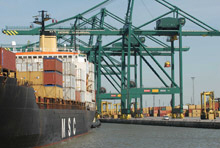
Typical street scene in Santa Ana, El Salvador. (Photo: iStock)
IMF Survey: Budgetary Austerity Can Help Trim Trade Deficits
September 14, 2011
- IMF research finds fiscal consolidation has large and long-lasting effect on current account
- If monetary stimulus scope is limited, external adjustment is just as large but more painful
- When many countries consolidate at the same time, the current account adjustment is smaller
Spending cuts and tax hikes are expected to be a fact of life in many economies over the coming years.

For economies with both trade and budget deficits, fiscal consolidation of right magnitude may actually reduce both deficits (photo: Fievez/SIPA/Newscom)
WORLD ECONOMIC OUTLOOK
Many advanced economies need to reduce their budget deficit to restore fiscal sustainability. Emerging and developing economies are tightening to rebuild fiscal policy room and in some cases to restrain overheating pressures.
The IMF has examined the repercussions of budgetary cutbacks on external trade balances—finding that cutting the budget deficit can also improve a country’s current account balance. The research shows that a fiscal consolidation of 1 percent of GDP improves the current account by over a half percent of GDP within two years, with the improvement persisting into the medium term.
The current account improves because imports fall with weaker domestic consumption and investment, and exports rise with the currency depreciation that tends to follow fiscal tightening.
Two birds with one stone
“The link between fiscal and trade balances matters because for some economies that have both trade and budget deficits, policymakers are hoping to hit two birds with one stone—fiscal consolidation of the right magnitude may actually reduce both deficits,” said Abdul Abiad, who headed the IMF research team.
The research was released as part of a chapter in the IMF’s World Economic Outlook, which is published twice a year ahead of the institution’s Spring and Annual Meetings. Another chapter looks at how monetary policy should respond to swings in commodity prices, and advised central banks to focus on “underlying” inflation—that is inflation that excludes the effects of short-term movements such as temporary commodity price swings. The IMF’s main global economic forecasts will be released on September 20.
Constraints from fixed exchange rate
The research shows that when the exchange rate is fixed, as in the euro area, and scope for monetary policy stimulus is constrained, the current account adjustment in response to fiscal consolidation is just as large but more painful.
“What happens is that economic activity falls by more in these countries and the depreciation occurs not through the exchange rate but via a compression of domestic prices and wages. This is a process that’s often referred to as internal devaluation,” Abiad said in a video interview.
When economies tighten fiscal policies simultaneously, what matters for the current account is how much each economy consolidates relative to others.
The current pattern of fiscal adjustment plans will contribute to a narrowing of euro area imbalances, a decline in emerging Asia’s trade surpluses, and a widening of the U.S. current account deficit.
“Much of the improvement in the fiscal balance in the United States is coming from exit from stimulus and not progress on bigger ticket items such as entitlement spending. As a result, fiscal policy is not likely to help the U.S. reduce its current account deficit,” Abiad said.


